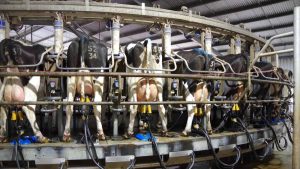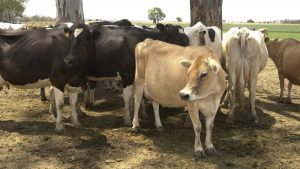
ADF sponsored a session at International Dairy Week to discuss this very topic. We heard Greg Jarman (Dairy Australia), Ben Rogers (National Farmers’ Federation [NFF]) and Glenn Fox (Fox Dairies) discuss the agricultural worker shortage. It was fantastic to have such key players in dairy and agriculture more broadly to share ideas for sustaining and growing our industry.
Much of what was discussed echoes the priorities outlined in the ADF election policy statement.
Australian dairying is a $13 billion farm, manufacturing and export industry that employs 37,400 Australians and feeds millions every day, and businesses throughout that supply chain have been struggling to find both skilled and yet-to-be skilled labour.
The upcoming Australian federal election provides a great opportunity for the Australian dairy industry. We need policy settings that support our industry’s economic recovery, including access to labour.
The Australian dairy industry needs immediate support and long-term planning to address the systemic worker shortage
As we all know, during the COVID-19 pandemic, dairy has continued to operate due to its status as an essential service. But maintaining supply has been challenged by input disruptions, border closures, a shortage of workers and more.
Many of these issues are long-standing but have been exacerbated by the pandemic, particularly the Omicron outbreak, which has seen thousands of workers along the dairy supply chain having to isolate because they have caught COVID-19 or are close contacts.
The National Agriculture Workforce Strategy, launched in December, was welcomed by ADF as it contains 37 recommendations to modernise agriculture’s image, attract and retain workers, embrace innovation, build people’s skills, and treat workers ethically.
The 2021 Federal Budget provided $30 million over the forward estimates to start work on several initiatives to implement several recommendations. While this is a good start, significantly more investment is required to implement the recommendations in the report.
ADF wants to see a $300 million commitment to implement seven initiatives in the National Agriculture Workforce Strategy. These initiatives in the strategy that the next government should fund as a priority are:
- Establishment of a Workforce Data Unit to aggregate and predict workforce gaps and trends.
- Establishment of an Agriculture Passport to capture and retain staff competencies and experience in the sector.
- Ensuring the education sector partners more strongly with industry to create learning experiences that meet industry development needs. This includes providing agriculture education from primary to tertiary level via STEAM (Science, Technology, Engineering, Arts and Mathematics).
- Expanding the Skilling Australians Fund to benefit the whole AgriFood workforce.
- Improving administration of the visa system to recognise the critical skills shortage in dairying and be resourced to improve efficiencies and lower costs to farmers and rural communities.
- Delivering an agriculture reputation and recognition campaign (including Employer of Choice Award) to promote best practice, create a positive culture and attract new workers to the industry.
- Establishment of a Leading Change Fund to implement strategically aligned workforce leadership and career development programs.
As well as the National Agriculture Workforce Strategy, last August the Australian Government announced it would introduce an agriculture visa for overseas workers to resolve critical worker shortages.
The conditions of the visa have been developed in consultation with industry, with leadership being provided by the NFF. A trial is planned with participants from south-east Asia.
Labour hire companies are being used, as they are already established, to work in partnership with peak bodies and farm businesses to ensure appropriate deployment of labour on farm. We want the next government to provide the NFF with leadership responsibility for evaluating the agriculture visa pilot and finalising its design.
It is critical that the NFF finalises the structure and operation of the agriculture visa. This will ensure that dairy and other commodity assessments and needs are appropriately reflected to inform the final program design.
We want politicians to do more to resolve dairy’s workforce shortage and capability deficits. Dairy farmers are busy with day-to-day management of their farms (majority are family owned) and unnecessary extra burdens of paperwork, reporting and supplying reams of information, stops farmers from participating. Let’s improve the availability of labour and the access to upskilling them, without the paper hassle.

























